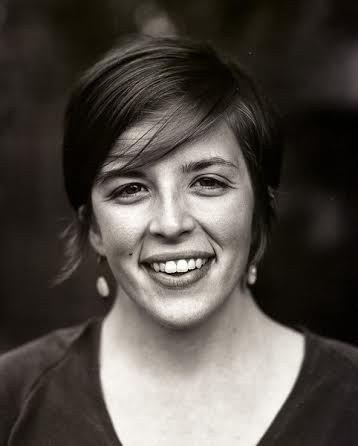Emerging Writers
In this issue we are pleased to introduce eight distinctive new writers to our readers. Seven of these writers appear in our journal for the first time. The issue opens with award-winning poems by two Goshen College students, Kate Stoltzfus and Mary Roth. (Kate’s story “The Bunny Murders” appeared in our College Student issue in November 2011.) Each of these poems articulates the legacy of a grandmother--one who traveled the globe, one who stayed on the farm--and finds unique images for the transmission of heritage.
Selections from our three featured poets also touch on themes of inheritance and history, as well as travel in a contemporary global environment. Jennifer Jantz Estes evokes the values and customs of her Kansas farming heritage and Julie Swarstad Johnson explores the history of iron furnaces and the communities around them in central Pennsylvania, while Sarah Kortemeier, on the other hand, juxtaposes New York post 9/11 with Hiroshima and writes of encounters in Japan and Amsterdam.
The three fiction writers in this issue—Lucy Bryan Green, Greta Holt, and Nate Malenke—explore contemporary values, social class, difference, and the ways in which our aspirations intertwine with violence in urban, rural, and international settings. Lucy Bryan Green’s haunting “The Club” probes themes of affiliation and identity in a series of encounters between a wealthy woman and her personal trainer. Greta Holt’s “Surviving,” set in a beauty salon in Botswana, explores the inequities of culture and class. Nate Malenke’s “Up in the Air, Junior Birdmen” evokes a father’s memory of his sensitive son’s passion for rockets.
Although most of these works do not portray explicitly Mennonite places or characters, they bear the influence or legacy of a faith that seeks to embody itself in relationships of integrity with work, the land and other people, sensitive to inequality and injustice, and desiring to serve a gospel of love and healing. Thus these poems and stories reveal compassionate imaginations alert to the challenge of interpersonal and intercultural understanding, and sensitive to the ironies of our aspirations to live in harmony with others.
--Ann Hostetler, editor
In this issue:
-
1
read more

Oracle
by Kate Stoltzfus"Oracle" won first prize in the best free verse poem category from the Indiana Collegiate Press Association's Literary Magazine Competition in April 2013. The poem was published in Red Cents, 2012, the award-winning creative arts journal of the Goshen College English Department.
-
1
read more

Elder Song
by Mary Roth"Elder Song" won second prize in the best free verse poem category from the Indiana Collegiate Press Association's Literary Magazine Competition in April 2013. The poem was published in Red Cents, 2012, the award-winning creative arts journal of the Goshen College English Department.
-
1
read more

Five Poems on Travel
by Sarah KortemeierFrom Ground Zero to Hiroshima, these poems create a network of perceptions, gently holding the globe as a whole while honoring silent spaces.
-
0
read more

Two Poems on the Past
by Jennifer Jantz EstesThese two poems draw on the author's recognition of her heritage within the farming and Mennonite communities of central Kansas.
-
0
read more

Three Poems on Place
by Julie Swarstad JohnsonThe first two poems below come from Pennsylvania Furnace, a manuscript which explores the history of the iron industry in central Pennsylvania.
-
2
read more

The Club
by Lucy Bryan GreenCally studies the rack of free weights and notes that someone has swapped the twenty and twenty-five pound dumbbells. She rearranges them, then picks up the forty-pounders sitting beneath the weight bench and returns them to the rack. On her way back to the counter, she sees a gold thread coiled on the floor. The necklace—a small cross on a cable chain—belongs to Janet Woodard. Cally examines it in her palm, tapping each of the pendant’s bulbous arms. Mrs. Woodard never takes off the anniversary gift—at least, she’s fond of saying so—and she has a habit of pressing the cross …
-
3
read more

Surviving
by Greta HoltAfter Leslie was killed, I walked the streets of Gaborone until the Botswana Bandanna caught my eye. Having nothing better to do, I went in to have my hair ‘tonged, frozen, wrapped, pineappled, ponied, braided or cockscrewed’ as the sign outside advertised. I asked the proprietress, a large woman wrapped in three prints, if that meant ‘corkscrewed.’ She blew puffs on each of her speckled orange acrylics and said she’d really no idea.
The proprietress waved me over to a swivel chair, called for an operator and sailed away. A blurry white woman with yesterday’s hair stared back from the …
-
2
read more
Up in the Air, Junior Birdmen
by Nathan MalenkeBuck’s biggest disappointment in his son’s ninth birthday wasn’t Jimmy’s lackluster response to his gift, but instead Jimmy’s decision to name his new hamster Armstrong.
“Buzz. Buzz is a good name,” Buck had insisted until he had felt the pressure of Mary’s hand on the small of his back. “I suppose Armstrong works, too.”
For months now, Buck has known that he will give Jimmy a model rocket set for his tenth birthday. The only books his son has read for the past year are about shuttles, space, the moon. Taped to the ceiling above Jimmy’s narrow bed is the …